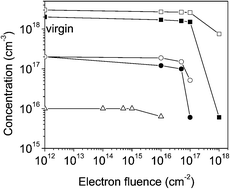Radiation effects in GaN materials and devices
Abstract
This article reviews the effects of radiation damage on GaN materials and devices such as light-emitting diodes and high electron mobility transistors.

* Corresponding authors
a
Institute of Rare Metals, B. Tolmachevsky, 5, Moscow, Russia
E-mail:
aypolyakov@gmail.com
b Department of Materials Science and Engineering, University of Florida, Gainesville, FL 32606, USA
c Department of Chemical Engineering, University of Florida, Gainesville, FL 32606, USA
d Department of Chemical and Biological Engineering, Korea University, Anam-dong, Sungbuk-gu, Seoul, Korea
This article reviews the effects of radiation damage on GaN materials and devices such as light-emitting diodes and high electron mobility transistors.

 Please wait while we load your content...
Something went wrong. Try again?
Please wait while we load your content...
Something went wrong. Try again?
A. Y. Polyakov, S. J. Pearton, P. Frenzer, F. Ren, L. Liu and J. Kim, J. Mater. Chem. C, 2013, 1, 877 DOI: 10.1039/C2TC00039C
To request permission to reproduce material from this article, please go to the Copyright Clearance Center request page.
If you are an author contributing to an RSC publication, you do not need to request permission provided correct acknowledgement is given.
If you are the author of this article, you do not need to request permission to reproduce figures and diagrams provided correct acknowledgement is given. If you want to reproduce the whole article in a third-party publication (excluding your thesis/dissertation for which permission is not required) please go to the Copyright Clearance Center request page.
Read more about how to correctly acknowledge RSC content.
 Fetching data from CrossRef.
Fetching data from CrossRef.
This may take some time to load.
Loading related content
